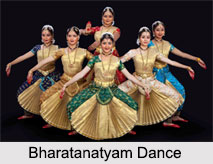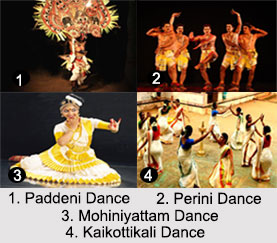 South Indian Dances are originated in the temples as a means to praise the Gods and Goddesses which were performed by Devadasis and gradually the concept of dancing girls originated who started nurturing the art of dance in the courts of the kings. South Indian states comprise of Tamil Nadu, Andhra Pradesh, Karnataka, and Kerala which offer varied and interesting culture, cuisine and art form. Though visibly diverse forms exist in the southern states, yet they are a part of the important culture of India.
South Indian Dances are originated in the temples as a means to praise the Gods and Goddesses which were performed by Devadasis and gradually the concept of dancing girls originated who started nurturing the art of dance in the courts of the kings. South Indian states comprise of Tamil Nadu, Andhra Pradesh, Karnataka, and Kerala which offer varied and interesting culture, cuisine and art form. Though visibly diverse forms exist in the southern states, yet they are a part of the important culture of India.The South Indian Culture is mainly a celebration of the eternal universe. Thus South Indian Dances are the embodiment of the outline of expression, social interaction or presented in a spiritual or performance setting. The states have popular form of dances which include classical, folk, tribal and modern forms. The dances of South India have a long and elaborate history. During the medieval era in India, South Indian Dances prospered with the support of various kings and art-admirers.
Different types of South Indian Dances
The dances such asBharatnatyam, Kuchipudi, Kathakali and Mohiniattam thrived as popular classical dances of the region. These dance forms originated from the days of the creation of the Natya Shastra. Following are the different types of South Indian Dances:
Bharatanatyam Dance: The classical Indian dance Bharatanatyam was invented from the art of temple dancers in the South India state of Tamil Nadu. Bharata Natyam is considered to the oldest form of dance and mother of all other types of classical dances in India.
Kathakali Dance: Kathakali is one of the most attracting classical Indian dance-drama presented by well trained artists. Kathakali was originated in Kerala in 17th century and got well-liked at every corner of India.
 Kuchipudi Dance: Kuchipudi is the most well-liked traditional dance form in South India performed with violin, flute and the tambura instruments and the characters first initiates themselves by the dharavu. Kuchipudi Dance originated in Andhra Pradesh state and got its name from Kuchipudi village near the Bay of Bengal.
Kuchipudi Dance: Kuchipudi is the most well-liked traditional dance form in South India performed with violin, flute and the tambura instruments and the characters first initiates themselves by the dharavu. Kuchipudi Dance originated in Andhra Pradesh state and got its name from Kuchipudi village near the Bay of Bengal.Odissi Dance: Odissi is the oldest existing dance form in India that originated from state of Odisha. Odissi Dance is traditional and a very old style of dance performed in the temples.
Mohiniyattam Dance: The Mohiniyattam is a popular dance form with a drama in dance, performed with delicate gestures and footwork. Mohiniyattam is another classical dance style from Kerala and one of the eight principal Indian classical dances.
Padayani or Paddeni Dance: Padayani or Paddeni is connected with the festivals of certain temples. Padayani dancers wear Kolams of different shapes, colours and designs, painted on the stalks of areca nut fronds.
Kummi and Kolattam Dance: Kummi is a very easy form of dance, where dancers form circles and clap as they dance. Kummi and Kolattam are the dances performed by the tribal womenof Tamil Nadu, during certain festivals.
Kargam and Puli Vesham Dance: It is performed by men, in which they balance pots, filled with raw rice and enclosed by a tall pointed bamboo frame covered with flowers, on their head.
For more, visit the link below: